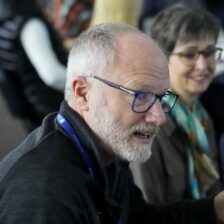 The last seven posts on this site have highlighted the learning from my recent thesis that I wrote for my doctoral studies. Perhaps I was aware of these conclusions before, and intuitively knew it, yet having them rise up from my research and then being forced to articulate them was extremely encouraging for me.
The last seven posts on this site have highlighted the learning from my recent thesis that I wrote for my doctoral studies. Perhaps I was aware of these conclusions before, and intuitively knew it, yet having them rise up from my research and then being forced to articulate them was extremely encouraging for me.
There was one final aspect that I decided to not put down as a final conclusion in my thesis but simply called it “Confession of a Researcher.” Let me explain.
The research method that I used is a method known as Narrative Research, hearing people’s stories in the midst of real life circumstances. Five individuals had agreed to allow me to include them in my research during the 8 month initiative of my research. I interviewed these 5 individuals before the initiative started to get a base line of where their lives were at. I then interviewed them again after the 8 month initiative was over to determine what, if any, life change took place and also what may have lead to this life change.
My confession is this: two of the people, who I interviewed at the start, when the interview was over, I had already come to my conclusions about them: I wasn’t expecting any life change to take place in their lives over the 8 months. I had determined that they would be a part of my research that demonstrated that not everyone will learn as I expect. What I thought this exactly I’m not sure, but something about their language and tone led me to this conclusion.
I was wrong!
In the final interview after the 8 months was over, one stated: “This was much more of a spiritual experience than I was ever expecting.” This person then went on to describe how the bible readings we looked at and discussed moved them in ways they were not expecting. At the start they simply thought that they would gain “head knowledge” about the topic to allow them to serve their community in a better way, nothing else. However through the 8 months their heart was moved in unexpected ways.
The other remarked: “If I had to do it over again, I’d spend less time on church committees and more time engaging my community. I thought I knew the bible, yet I found out that I was missing huge components of it.”
My reflex to quickly come to conclusions is not a characteristic that I pride myself in always. Sure, at times it is important as a leader to make decisions to move things forward. However, when it comes to life change, who am I to decide how the Holy Spirit will move? Who am I to think that I can tell what is going on in someone’s heart to determine whether or not the “soil” is ready to receive “seed” that will reap a huge harvest?
I need to always remind myself to simply be faithful to my calling to “go and make disciples.” The disciples Jesus chose weren’t any other rabbi’s choice, yet they changed the world. Who am I to determine how journeying with someone will impact them?
May I always decide that I will take the discipleship journey with others, to provide them what I can, to model what I know, and allow God to be God in the process. It’s much more enjoyable that way.
For the Kingdom.
